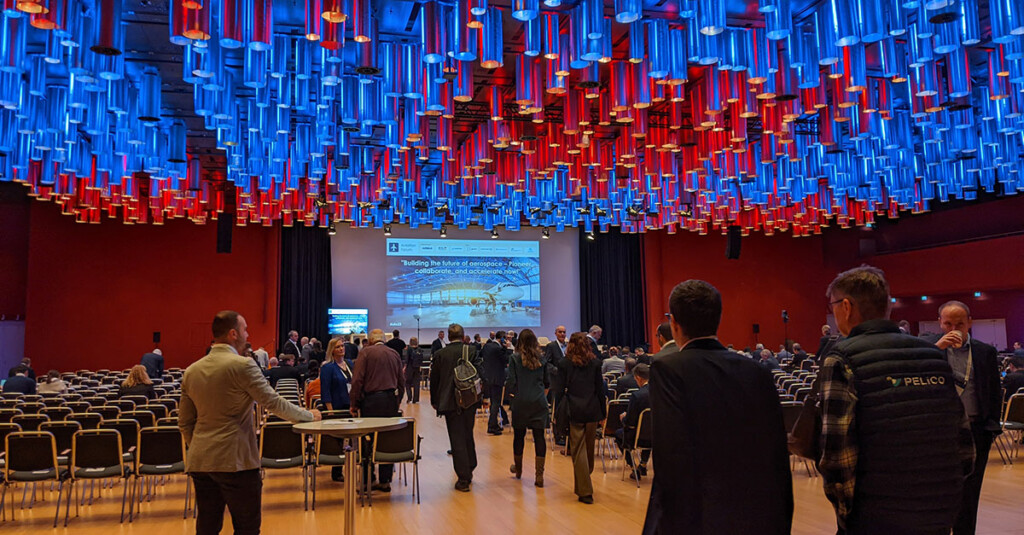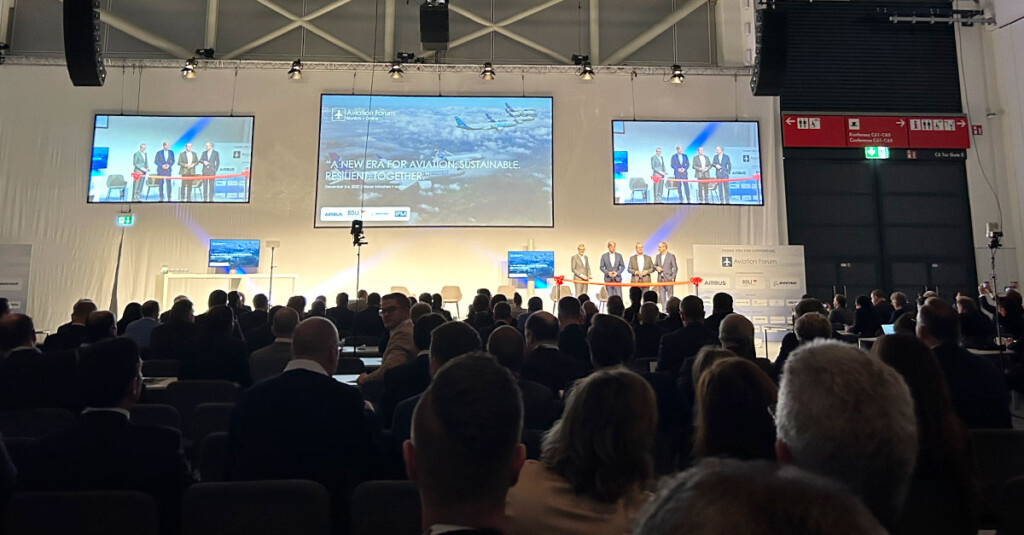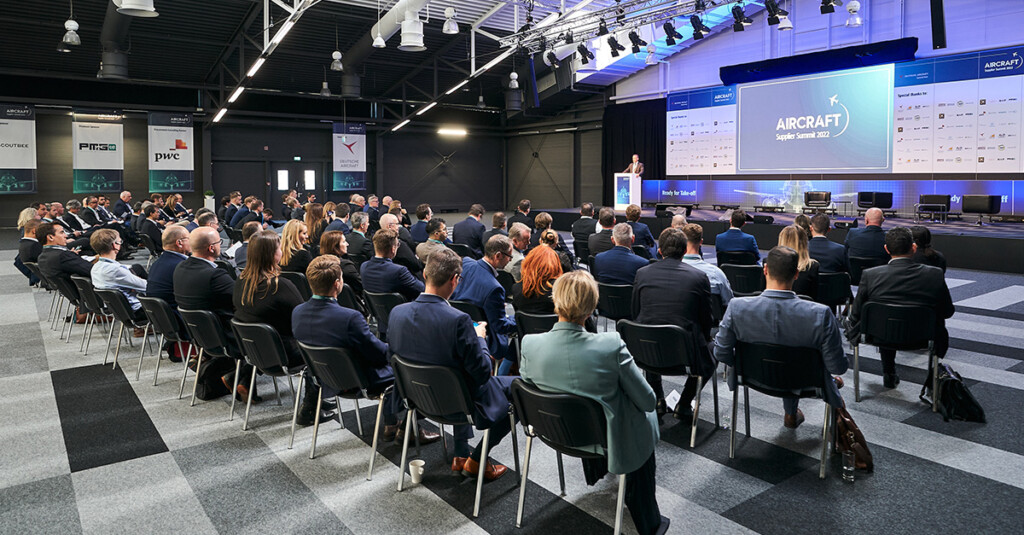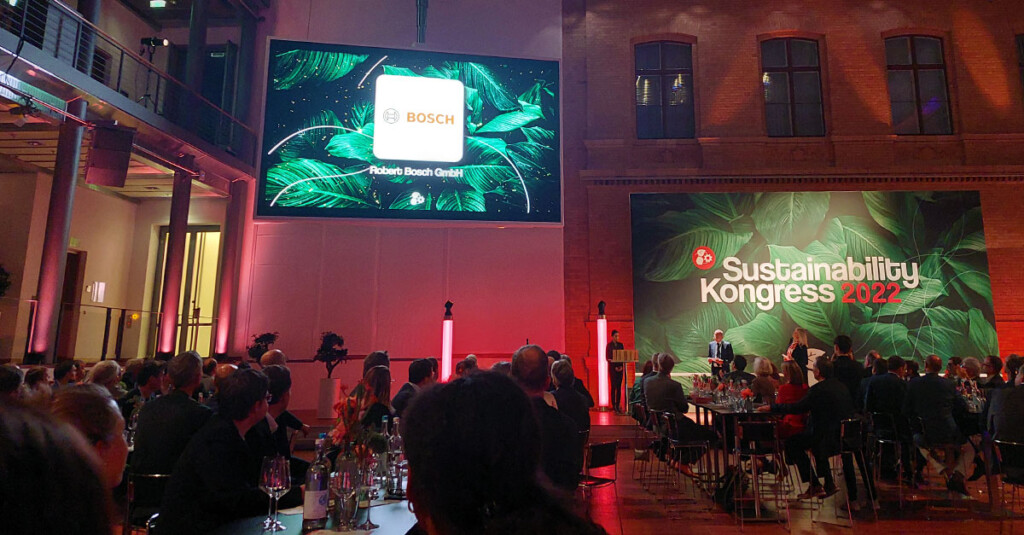Skip to content
Held on December 5, 2023, the Aviation Forum 2023 showcased the industry's resilience and determination, commencing sharply at 9:00 am. Despite adverse weather conditions that caused numerous flight cancellations, over 1,300 attendees, 130 exhibitors, and 70 speakers converged for the two-day event. Beyond the impressive numbers, the event quality was also reflected by the insightful contributions and discussions which encapsulated the current state, challenges, and opportunities of the aerospace industry.In essence, all the discussions revolved around a common goal: shaping the future of aerospace.Ramping up: a multifaceted challengeThe aerospace industry is gearing up for a substantial increase in production, targeting approximately 100 aircraft per month. Although international traffic is approaching pre-COVID levels, Airbus and its suppliers face a multifaceted challenge amid a poly-crisis, encompassing issues like interest rates, climate challenges, and material shortages.Managing the ramp-up is not a singular challenge but a poly challenge, given the myriad of interconnected issues.Collaboration emerged as a pivotal theme, recognizing that 80 % of the industry's added value stems from procurement activities. Cooperation between different tiers and OEMs is deemed crucial for future success.Collaboration: unlocking supply chain efficienciesJürgen Westermeier, CPO of Airbus, emphasized that collaboration is key to enhancing supply chain efficiencies. Airbus introduced four major initiatives:ZeroM: aimed at reducing the impact of supply chain disruptionsAXEXX: focused on increasing competitiveness and reducing costsAeroExcellence: a cross-industry initiative to mature supplier industriesNextEra: aiming to secure industrial continuity through collaboration and data leverageSustainability: the future license to operateSustainable Aviation Fuel (SAF) is crucial for its sustainability efforts, but the industry is also exploring alternative energy sources, such as liquid hydrogen (LH2) fuel cells and GKNA LH2 concepts.Holistic sustainability requires the involvement of all stakeholders: suppliers, OEMs, operators, regulators, and political and business leaders.In addition to alternative energy, industry efforts include recycling materials, exploring eco-friendly alternatives, reducing buffer stocks, and leveraging data and technology for a greener future.Challenges and opportunities aheadOne of the major topics for the future is the concept of a "digital material passport". Efficient systems and digitization will be essential for tracking materials throughout the aircraft lifecycle.Another future topic are environmentally friendly materials such as green aluminum or green steel. Yet industry acceptance is still at an early stage for these potential alternatives.Reducing unnecessary buffer stocks is crucial not only for cost but also for sustainability.Collaborative, transparent, and open use of data and technology can drive a greener future, too. But the industry grapples with the challenge of building trust and taking decisive action. In conclusion, the Aviation Forum 2023 illuminated the path forward for the aerospace industry, emphasizing collaboration, sustainability, and technological innovation as key drivers for future success.

"A new era of aviation: Sustainable. Resilient. Together!" Under this motto, Prof. Dr. Walther from IPM welcomed around 1,900 participants and 130 exhibiting organizations to this year's Aviation Forum, now in its 12th year. Munich was the venue for the second time.The event's title set the central themes: climate-neutral aviation, a resilient supply chain amidst a renewed rise in production rates, and partnership-based collaboration between all stakeholders. All three are key success factors for mastering the challenges of the future.Goals and strategies for more sustainability, resilience and competitivenessIn his opening speech, Airbus CPO and Aviation Forum host Jürgen Westermeier highlighted his company's ambitious goals: The production of 75 A320 family aircraft per month and zero-emission flying by 2050.In her highly acclaimed presentation, Marjolaine Grange, Head of Purchasing at Safran Group, spoke about the systemic axes along which performance and competitiveness in the aerospace supply chain can be enhanced. She emphasized the importance of SupplyOn AirSupply as a collaboration standard for aerospace SCM processes. It is used by 10,000 suppliers, including currently 550 at Safran alone and 700 more planned in the future.The industry standard AirSupply is growingSupplyOn works very closely with the industry consortium BoostAeroSpace for AirSupply, making it a successful industry standard and community solution.The AirSupply community continues to grow: this year, SupplyOn joyfully welcomed new AirSupply customer MT Aerospace to its booth:Future-proof and efficientKlaus Richter, former host of the Aviation Forum and now CEO of the Diehl Foundation, spoke about what it means to bounce back after the crisis as a major Tier 1 and to prepare properly for the future.Highlights of the two-day Aviation Forum from my point of view were, besides the expert presentations, the many personal conversations at the booths, the exchange at the Gala Dinner, which has become a tradition by now, as well as the Executive Workshops with brainstorming on the supply chain of the future.Factory Tours: Aviation hands-onThe Aviation Forum concluded with the Factory Tours. Destinations for these tours included SupplyOn customers Airbus Defence & Space and Deutsche Aircraft, as well as key industry players such as MTU Aero Engines and GKN Aerospace.The author was impressed by the transition at Deutsche Aircraft from a MRO provider for the Do328 to an OEM/integrator for the new D328eco. The aircraft is set to be developed and manufactured in Germany.Following the still heavily Corona-influenced 11th Aviation Forum last year, it was widely evident how important personal contacts are in an industry which is based on collaboration.The date and location for the Aviation Forum 2023 have already been set: December 5 and 6, 2023, then again in Hamburg.

Co-organized by the Berlin Institute Supply Chain Management, the German OEM Deutsche Aircraft hosted the first Aircraft Supplier Summit on November 15 and 16, 2022 at Leipzig Airport.Leipzig is the chosen final-assembly-line (FAL) location for the D328eco, the groundbreaking, forward-looking platform building upon the legendary Dornier Do328 aircraft, for which Deutsche Aircraft is the type certificate holder. The D328eco will rely on Sustainable Aviation Fuel (SAF) as transition to zero-emission flying. Planned by 2030, also hydrogen propulsion will be explored. The FAL construction is planned to start in 2023 already.Key topics of this summit wereHow Deutsche Aircraft and its partners shape the future of sustainable flyingCreating supply chain resilience in a VUCA* worldTechnology-enabled supplier collaborationESG* as a new mindset, towards improved sustainabilityPartnership between Deutsche Aircraft and its suppliersImproving supplier collaboration & supply chain resilienceIt is impossible to mention all the highly interesting keynotes with the all the valuable insights. Therefore, just some highlights from SupplyOn perspective:BoostAeroSpace CEO Rodolphe Péricat explained how the organization contributes to technology-enabled supplier collaboration. Building on a strong industry community, it addresses increased security needs and governs dedicated supplier collaboration platforms, including SupplyOn AirSupply.Deutsche Aircraft has chosen SupplyOn as strategic partner in order to digitally manage collaboration with suppliers and enable structured communication.ThyssenKrupp Aerospace CEO Patrick Marous shared how they foster supply chain resilience with their Supply Chain Control Tower. By considering resistance, forecast, avoidance, inventory and capacity buffers it secures the company’s ability to deliver in a VUCA world.One highlight of the summit for sure was the awarding & contract signature ceremony live on stage for two new suppliers of Deutsche Aircraft: Bucher Leichtbau from Fällanden, Switzerland, and Elbe Flugzeugwerke (EFW), Dresden. The latter is also a SupplyOn customer for AirSupply.Great forum, to be continuedThe Aircraft Supplier Summit was a unique opportunity to exchange with decision makers of Deutsche Aircraft. It was also a good forum for face-to-face discussions with strategic partners and suppliers.To wrap up, attendees were asked to provide their feedback on the event. Among the key take-ways mentioned were insights on supply chain resilience, sustainability, and technology as an enabler. But also partnership and inspiration were important attributes of the conference.The next Aircraft Supplier Summit is already scheduled: Nov 7 and 8, 2023, again in Leipzig. See you then! --*VUCA: volatility, uncertainty, complexity, ambiguity** ESG: environment, social, governance

The Sustainability Kongress, organized by the Berlin Institute of Supply Chain Management, was a high-profile event, with keynotes by the former Minister of Foreign Affairs of Germany and Parliamentary State Secretary in the Ministry for Economic Affairs and Climate Action. Alongside Joschka Fischer and Michael Kellner, various corporate executives and purchasing managers presented their views on sustainability in a world in transition, where time to act is running out. Among the speakers were Schaeffler CEO Klaus Rosenfeld, Deutsche Bahn CEO Dr. Richard Lutz, Airbus Executive Nicole Dreyer-Langlet and BASF Executive Saori Dubourg.Sustainable management is in demandThe key topic of the congress were sustainable business practices. Particularly, it was about the need for embedding sustainability in the corporate strategy as well as a basic attitude for the entire organization. A clear, transparent and measurable sustainability reporting system was called for.Two aspects in particular were discussed for reducing the carbon footprint. One key factor was the impact of the inbound supply chain (i.e. upstream supply chain = "Scope 3") on CO2 emissions. The second central topic was product development aligned to sustainability principles. This considers CO2 emissions both during product use and at the end of the product life cycle, catchword: circular economy.In addition, other important ESG topics, such as diversity and the need for political guidelines for sustainable business, were also discussed intensively.Award-winning sustainabilityIn three categories, the jury of the Sustainability Kongress honored the most innovative concepts, initiatives and companies among all applicants.Sustainability AwardCategory ProcurementWinner: Deutsche BahnFinalists: EnBW, MieleCategory OperationsWinner: thyssenkrupp Material ServicesFinalists: GEA, SiemensCategory R&DWinner: TE ConnectivityFinalists: Knorr-Bremse, BlueMovement BSHBuilding Public Trust AwardCategory Non-Listed CompaniesWinner: Robert BoschSupplyOn sincerely congratulates all winners and finalists, including SupplyOn customers BMW, Bosch, Deutsche Bahn and Siemens.Sustainability at SupplyOnAs the standard for supplier collaboration, SupplyOn supports its customers and their suppliers in achieving their sustainability goals. This applies in particular to Greenhouse Gas (GHG) Scope 3 topics, ranging from surveys on the Company Carbon Footprint (CCF) and the Product Carbon Footprint (PCF) to solution modules with regard to the Supply Chain Corporate Due Dilligence Act (Lieferkettensorgfaltspflichtengesetz, LkSG).
